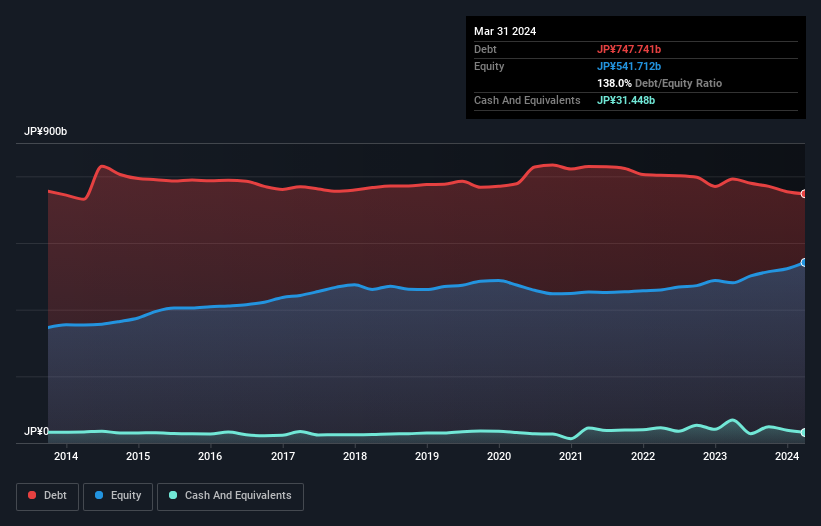Warren Buffett famously said, 'Volatility is far from synonymous with risk.' It's only natural to consider a company's balance sheet when you examine how risky it is, since debt is often involved when a business collapses. As with many other companies Tobu Railway Co., Ltd. (TSE:9001) makes use of debt. But the real question is whether this debt is making the company risky.
When Is Debt A Problem?
Generally speaking, debt only becomes a real problem when a company can't easily pay it off, either by raising capital or with its own cash flow. Part and parcel of capitalism is the process of 'creative destruction' where failed businesses are mercilessly liquidated by their bankers. However, a more usual (but still expensive) situation is where a company must dilute shareholders at a cheap share price simply to get debt under control. Having said that, the most common situation is where a company manages its debt reasonably well - and to its own advantage. The first thing to do when considering how much debt a business uses is to look at its cash and debt together.
View our latest analysis for Tobu Railway
What Is Tobu Railway's Net Debt?
The image below, which you can click on for greater detail, shows that Tobu Railway had debt of JP¥747.7b at the end of March 2024, a reduction from JP¥792.2b over a year. However, because it has a cash reserve of JP¥31.4b, its net debt is less, at about JP¥716.3b.

How Strong Is Tobu Railway's Balance Sheet?
We can see from the most recent balance sheet that Tobu Railway had liabilities of JP¥386.3b falling due within a year, and liabilities of JP¥776.0b due beyond that. Offsetting these obligations, it had cash of JP¥31.4b as well as receivables valued at JP¥71.5b due within 12 months. So its liabilities outweigh the sum of its cash and (near-term) receivables by JP¥1.06t.
This deficit casts a shadow over the JP¥545.6b company, like a colossus towering over mere mortals. So we definitely think shareholders need to watch this one closely. After all, Tobu Railway would likely require a major re-capitalisation if it had to pay its creditors today.
In order to size up a company's debt relative to its earnings, we calculate its net debt divided by its earnings before interest, tax, depreciation, and amortization (EBITDA) and its earnings before interest and tax (EBIT) divided by its interest expense (its interest cover). Thus we consider debt relative to earnings both with and without depreciation and amortization expenses.
As it happens Tobu Railway has a fairly concerning net debt to EBITDA ratio of 5.6 but very strong interest coverage of 21.3. This means that unless the company has access to very cheap debt, that interest expense will likely grow in the future. It is well worth noting that Tobu Railway's EBIT shot up like bamboo after rain, gaining 30% in the last twelve months. That'll make it easier to manage its debt. There's no doubt that we learn most about debt from the balance sheet. But it is future earnings, more than anything, that will determine Tobu Railway's ability to maintain a healthy balance sheet going forward. So if you want to see what the professionals think, you might find this free report on analyst profit forecasts to be interesting.
Finally, a company can only pay off debt with cold hard cash, not accounting profits. So we clearly need to look at whether that EBIT is leading to corresponding free cash flow. Looking at the most recent three years, Tobu Railway recorded free cash flow of 42% of its EBIT, which is weaker than we'd expect. That weak cash conversion makes it more difficult to handle indebtedness.
Our View
While Tobu Railway's level of total liabilities has us nervous. For example, its interest cover and EBIT growth rate give us some confidence in its ability to manage its debt. Taking the abovementioned factors together we do think Tobu Railway's debt poses some risks to the business. While that debt can boost returns, we think the company has enough leverage now. The balance sheet is clearly the area to focus on when you are analysing debt. However, not all investment risk resides within the balance sheet - far from it. Case in point: We've spotted 3 warning signs for Tobu Railway you should be aware of, and 2 of them are concerning.
If, after all that, you're more interested in a fast growing company with a rock-solid balance sheet, then check out our list of net cash growth stocks without delay.
Valuation is complex, but we're here to simplify it.
Discover if Tobu Railway might be undervalued or overvalued with our detailed analysis, featuring fair value estimates, potential risks, dividends, insider trades, and its financial condition.
Access Free AnalysisHave feedback on this article? Concerned about the content? Get in touch with us directly. Alternatively, email editorial-team (at) simplywallst.com.
This article by Simply Wall St is general in nature. We provide commentary based on historical data and analyst forecasts only using an unbiased methodology and our articles are not intended to be financial advice. It does not constitute a recommendation to buy or sell any stock, and does not take account of your objectives, or your financial situation. We aim to bring you long-term focused analysis driven by fundamental data. Note that our analysis may not factor in the latest price-sensitive company announcements or qualitative material. Simply Wall St has no position in any stocks mentioned.
Have feedback on this article? Concerned about the content? Get in touch with us directly. Alternatively, email editorial-team@simplywallst.com
About TSE:9001
Good value with acceptable track record.
Market Insights
Community Narratives



